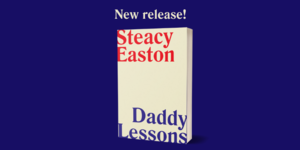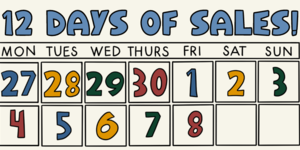
We're having a spooky season sale!
Where do spiders do their shopping? On the web! ️
You can too! We have 14 of our spookiest reads on sale until Friday Nov. 3 – a 20% discount will be automatically applied in your cart.
Lesser Known Monsters of the 21st Century by Kim Fu
In the twelve unforgettable tales of Lesser Known Monsters of the 21st Century, the strange is made familiar and the familiar strange, such that a girl growing wings on her legs feels like an ordinary rite of passage, while a bug-infested house becomes an impossible, Kafkaesque nightmare. Each story builds a new world all its own: a group of children steal a haunted doll; a runaway bride encounters a sea monster; a vendor sells toy boxes that seemingly control the passage of time; an insomniac is seduced by the Sandman. These visions of modern life wrestle with themes of death and technological consequence, guilt and sexuality, as they unmask the contradictions that exist within all of us.
The Murder of Halland by Pia Juul, translated by Martin Aitken
When Halland is found murdered almost right outside his door, his widow, Bess, is of course the prime suspect. She isn't worried about that, though, but about the daughter she abandoned years ago. As the police investigate, the slightly cantankerous Bess instead follows a trail of her own regrets and misapprehensions.
Atmospheric and haunted by the uncanny, The Murder of Halland is anything but your typical whodunnit. It won Denmark's most important literary prize, Den Danske Banks Litteraturpris, and its English translation was longlisted for the IMPAC Dublin Prize.
The Eyelid by S.D. Christowska
An unnamed, unemployed, dream-prone narrator finds himself following Chevauchet, diplomat of Onirica, a foreign republic of dreams, to resist a prohibition on sleep in near-future Greater America. On a mission to combat the state-sponsored drugging of citizens with uppers for greater productivity, they traverse an eerie landscape in an everlasting autumn, able to see inside other people’s nightmares and dreams. As Comprehensive Illusion – a social media-like entity that hijacks creativity – overtakes the masses, Chevauchet, the old radical, weakens and disappears, leaving our narrator to take up Chevauchet's dictum that "daydreaming is directly subversive” and forge ahead on his own.
Sing, Nightingale by Marie-Hélène Poitras, translated by Rhonda Mullins
When the curtain rises on Malmaison, it reveals a once-enchanting estate, quietly falling into darkness and ruin, and at the heart of it, a father, one of a long line of fathers who have flourished at the expense of those around them. The silence seems peaceful, but lurking under it is a deep malevolence, scores of ugly and violent secrets kept by cast-off mistresses and abandoned daughters.
Ever-greedy, the father brings in Aliénor, a woman who promises to make the lands give even more of themselves; the plants will flourish, the animals will multiply, each feast will be more sumptuous than the last. The father thinks the stage is set to satisfy his every desire, but Aliénor will bring a new script, one in which the hunters are hunted and a new reign will begin.
The Doll's Alphabet by Camilla Grudova
Dolls, sewing machines, tinned foods, mirrors, malfunctioning bodies – by constantly reinventing ways to engage with her obsessions and motifs, Camilla Grudova has built a universe that's highly imaginative, incredibly original, and absolutely discomfiting. The stories in The Doll's Alphabet are simultaneously childlike and naive, grotesque and very dark.
The Embalmer by Anne-Renée Caillé, translated by Rhonda Mullins
Imagine rubbing shoulders with the dead for most of your life. As she picks the brain of her father for the most gruesome and thought-provoking secrets of his embalming career - from the drowned boy whose organs were eaten by eels to how to inject just the right amount of colour into a corpse's skin for that blushing look - the narrator must look her parents' deaths, and her relationship with them, straight in the eye.
Quietly poetic, The Embalmer glimpses at something most would rather look away from.
The Country Will Bring Us No Peace by Matthieu Simard, translated by Pablo Strauss
Simon and Marie can’t seem to have a baby. And so they flee the city for an idyllic village, where things will certainly be better. But the town is gloomy, even hostile -- things haven’t been the same since the factory closed down and a broadcast antenna was erected. Now there are no birds singing, and people have started disappearing.
The Laws of the Skies by Gregoire Courtois, translated by Rhonda Mullins
Twelve six-year-olds and their three adult chaperones head into the woods on a camping trip. None of them make it out alive. The Laws of the Skies tells the harrowing story of those days in the woods, of illness and accidents, and a murderous child.
Part fairy tale, part horror film, this macabre fable takes us through the minds of all the members of this doomed party, murderers and murdered alike.
The Agents by Gregoire Courtois, translated by Rhonda Mullins
The agents don’t know what they’re agents of, but they’re very busy agenting, which means watching endless data feeds in their cubicles, cubicles that are piled one on top of another in a massive tower in which the agents both live and work. Empty floors serve as battlefields where different guilds of agents fight for territory. It seems that defenestration is the only way out, the ‘ballet of suicides.’
It Is an Honest Ghost by John Goldbach
Teenagers philosophize on the nature of ontology while fearing there's a ghost in the old mill they're stuck in; a man encounters an old friend in the unlikeliest of places; nineteenth-century inventor Sigismund Mohr is vividly brought back from obscurity; and two journalists travel to Kenya for a conference, where one of them has a paranoid breakdown.
It Is an Honest Ghost is a funny and often eerie collection that explores what lies beyond mortality – if anything, that is.
And the Birds Rained Down by Jocelyn Saucier, translated by Rhonda Mullins
Deep in a Northern Ontario forest live Tom and Charlie, two octogenarians determined to live out the rest of their lives on their own terms: free of all ties and responsibilities, their only connection to civilization two pot farmers who bring them whatever they can't eke out for themselves. But their solitude is disrupted by the arrival of two women. The first is a photographer searching for survivors of a series of catastrophic fires nearly a century earlier; the second is an elderly escapee from a psychiatric institution. The little hideaway in the woods will never be the same. Originally published in French, And the Birds Rained Down, the recipient of several prestigious prizes, including the Prix de Cinq Continents de la Francophonie, is a haunting meditation on aging and self-determination.
Little Beast by Julie Demers, translated by Rhonda Mullins
A little girl with a beard must find herself a home in this contemporary fairy tale.
It's 1944, and a little village in rural Quebec sits quietly beside an aging mountain and an angry river. The air tastes of kelp, and the wind keeps knocking over the cross. Beside that river an eleven-year-old girl lives with her parents. Her mother is very sad, and her father has vanished because he can't bear to look at his own daughter. You see, this little girl has suddenly sprouted a full beard.
And so her mother has shut the curtains and locked the girl inside to keep her safe from the townspeople, the Boots, who think there's something wrong with a bearded little girl. And when they come for her, she escapes into the wintry night.
Translated from the French, Little Beast turns the modern fairy tale on its bearded head.
A thick fog rolls in over Shivering Heights. The river overflows, the sky is streaked with toxic green, parasites proliferate in torrential rains and once safely classified species – humans included – are evolving and behaving in unprecedented ways. Against this poetically hostile backdrop, a biologist, Laura, fights to understand the nature and scope of the changes transforming her own body and the world around her.
Ten lush and bracing linked climate fictions depict a world gorgeous and terrifying in its likeness to our own.
The Dark Library by Cyrille Martinez, translated by Joseph Patrick Stancil
In Cyrille Martinez’s library, the books are alive: not just their ideas or their stories, but the books themselves. Meet the Angry Young Book, who has strong opinions about who reads what and why. He’s tired of people reading bestsellers, so he places himself on the desks of those who might appreciate him. Meet the Old Historian who mysteriously vanished from the stacks. Meet the Blue Librarian, the Mauve Librarian, the Yellow Librarian, and spend a day with the Red Librarian trying to banish coffee cups and laptops.
Then one day there are no empty desks anywhere in the Great Library. A great horde of student workers has descended, and they will scan every single book in the library: the much-borrowed, the neglected, the popular, the obscure. What will happen to the library then? Will it still be necessary?


